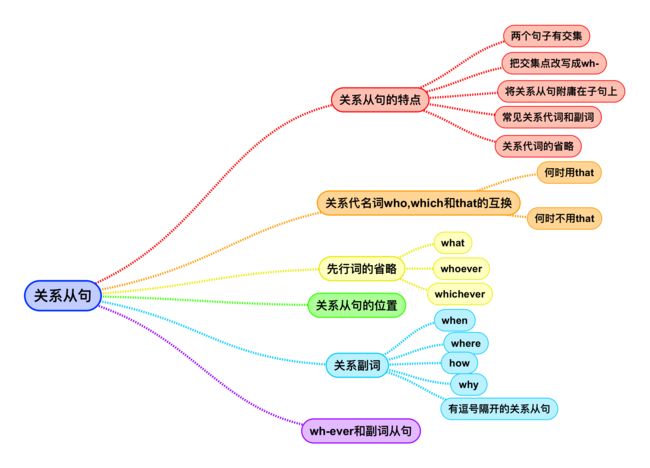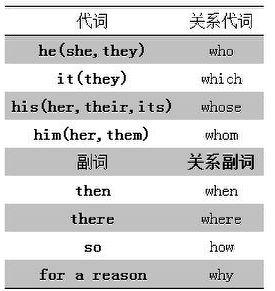今天我们学习复句中的最后一个知识点,关系从句。
一、关系从句的特点
① 两个句子有交集(有一个重复元素)
句1:For boyfriend I'm looking for a man.
句2:He is tall, rich, and well-educated.
这里的两个句子中a man和he就有交集,说的是同一个人。
② 把交集点改为关系词的拼法(wh-),产生连接词的功能
句2:who(
he) is tall, rich, and well-educated.
③ 将关系从句附庸于主要子句的交集点,当作形容词从句看,修饰名词
For boyfriend I'm looking for a man who is tall, rich, and well-educated.
从以上不难看出,关系从句不同于其他从句的一点是,它的连接词不是自行添加的,而是从句中的字眼改写过来的(wh-)。
④ 关系从句中的交集点:关系代名词和关系副词
⑤ 关系代词的省略
我们考虑一下,关系从句中的关系词,通常有两个功能,一是代名词功能(句子中有重复的元素);二是连接词的功能(标识另一个句子的开始),如果两个句子断句很清楚,就可以省略掉关系代名词。
句1:The man is my uncle. 句2: You saw him just now.
句2中的him是宾语,与句1中的man重复,可以改写成关系代名词whom
:You saw whom just now
两句联合起来就是:
The man whom you saw just now is my uncle.
此处如果省略掉whom,句子的断句依然很清晰。如果关系代名词是主语的话,就不适合省略。
句1:The man is my uncle. 句2:He was here just now.
句2改写成关系代名词形式:
who was here just now.
两句联合:
The man who was here just now is my uncle.
此句不适合省略掉who,这是因为关系代名词做宾语的时候会往前移动,句子的断句很清晰,而做主语就不行了。
二、关系代名词who、which和that的互换
① 何时该使用that
当关系代名词有明确的指示功能的时候,使用that代替之前的关系代名词,常常用在下定义的句子中:
Man is an animal that is capable of reason.
Money is the only thing that interests him.
He's the best man that I can recommend.
② 何时不该用that
同样的道理,如果关系代名词缺乏明确的指示功能,就不能用that替换。(用作补充,用逗号隔开的那种)
For boyfriend, I'm considering your brother John, who is tall, rich, etc.
这里的your brother John是一个专有名词,代表一个人。不是普遍意义上的哪种人,没有明确的指示功能,只是补充说明John的特点
I like Time Classic Words, which many people like, too.
三、先行词的省略
关系代名词与现行词重复,有时候可以省略掉现行词,但有两个前提:
1> 先行词必须是没有内容、空的字眼(thing、people);
2> 关系从句与先行词之间不能有逗号隔开;
① what
局1:I have the thing. 句2:You need it.
改写成:I have the thing which you need.省略掉which以后(当宾语可省略)
I have the thing you need.
此处省略掉the thing现行词以后就缺少了宾语,所以要修改成:
I have what you need.
将关系代名词由which改写成what,可以省略掉前面的一个现行词。
② whoever
I'll shoot any person that moves.
如果要省略掉现行词any person就得首先将关系词改成who,然后再变形为whoever(取代any),表示不论是谁,就成了:
I'll shoot whoever moves.
③ whichever
You can take any car that you like.
省略掉现行词any car, 改成:
You can take whichever car you like.
四、关系从句的位置
一般来说,关系从句要放在现行词的后面,这是因为关系从句是形容词类,具体在使用的时候其实是观察哪个位置表达的意思最清楚来进行判断的。
句1:There are two apples in the basket.
句2:The basket is lying on the table.
形成关系从句:
There are two apples in the basket which is lying on the table.
这个位置使用的关系连接词which很清楚,因为which后面的动词is是单数形式,也就表示which是单数,代表的是前面的in the basket。
再看一个例子:
句1:You can find two apples in the basket.
句2:I bought the apple.
如果我们写成:
You can find two apples which I bought in the basket.
表达是意思就不清楚了,这时候我们只有将in the basket提前,修饰 can find。
In the basket you can find two apples which I bought.
总之为了表达的清楚,关系从句必须要尽量靠近修饰的对象,假如关系从句直接放在先行词后面会引起误解就要移开,变动句型。
五、关系副词
我们讲完了关系代词,最后再来看看关系副词的情况,关系副词不同于关系代词是重要的名词类,关系副词的重要性不大,可以自由省略,只有在有括弧形的逗号隔开时候不能省略。
① when(是then的改写)
句1:The rain came at a time. 句2:The farmers needed it most then.
改写成:
The rain came at a time when the farmers needed it most.
由于at a time和when都是无内容的字眼,在意思上是可有可无的副词,且同时出现就可以省略其中之一:
The rain came
at a timewhen the farmers needed it most.
但是需要注意的一点是名词类的先行词不能省略:
I need
some timewhen I can be with my daughter.
some time 在这里就不能省略。
② where(是there的改写)
句1:The car stopped at a place.
句2:Three roads met there.
改写成:The car stopped
at a placewhere three roads met.
where的变化类似于when,这里at a place和where可以择一省略。
③ how(so改写)
句1:Can you show me the way?
句2:You pulled off that trick in that way(==so)
句2中的in that way等同于so,两句改写成:
Can you show me the way (
how)you pulled off the trick?
how可以省略,由于the way的名词类不能省略。
④ why(for a reason改写)
句1:I've forgotten the reason.
句2:I called for a reason.
改写成:
I've forgotten the reason (
why) I called .
同样的道理,副词类的why可以省略,而the reason不行。
⑤ 有逗号隔开的关系从句:
可以将逗号视为一组括弧,扩号中的关系从句失去了指示功能,不能用that替代,只是补充说明用。
The best museum in Taiwan is the Palace Museum, where you can see our national treasures.
六、wh-ever和副词从句
这里总结一下,wh-ever当作no matter wh-解释的时候就表示让步、条件的语气,其后的从句等同于副词从句;但是如果解释为anyone、anything that的的时候就是关系从句省略掉现行词的情况,要当作名词从句来看。
Whichever (== No matter which) way you go, I'll follow. 副词从句
Whichever(==Any way that)you go is fine with me. 名词从句

